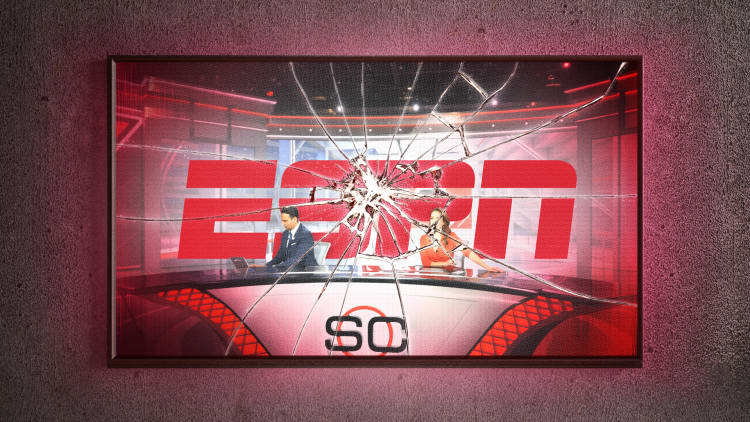
[ad_1]

Disney‘s ESPN is at a crossroads.
For more than 40 years, the world’s largest all-sports network has grown annual revenue by increasing cable subscription fees. ESPN first charged pay-TV distributors less than $1 per month per subscriber in the 1980s. In 2023, ESPN’s monthly carriage fee was $9.42 per subscriber, according to data from S&P Global Market Intelligence.
That business model is eroding. Since 2013, tens of millions of Americans have canceled their cable TV subscriptions, raising questions about ESPN’s future in an increasingly fragmented media landscape. CNBC spoke with multiple current and former Disney and ESPN executives about the network’s path ahead as part of the digital documentary “ESPN’s Fight for Dominance.”
ESPN reported domestic and international revenue grew just 1% to $4.4 billion in its most recent fiscal quarter. The network can no longer rely on price increases to make up the difference as the number of cable customers declines.
The company has a new two-part streaming plan to reinvigorate growth. First, this fall, Disney will make ESPN available outside the traditional cable TV bundle for the first time as part of a joint venture with Warner Bros. Discovery and Fox. The service, which does not yet have a price, will target noncable customers who want to watch sports but don’t want to pay $80 or $100 a month for a full bundle of networks.
Second, in fall 2025 ESPN will launch its flagship streaming service that will include everything ESPN has to offer, both live and on demand. It will include unprecedented personalization and will interact with ESPN Bet, the company’s licensed online sportsbook, and fantasy sports to cater to younger fans. The product will go well beyond ESPN+, which exists as a $10.99 streaming service that doesn’t include ESPN’s most expensive programming, such as all of “Monday Night Football.”
ESPN Chairman Jimmy Pitaro
Steve Zak Photography | FilmMagic | Getty Images
“The industry is in a transition phase right now,” ESPN Chairman Jimmy Pitaro said in an interview as part of CNBC’s documentary.
“We’re seeing declines in the traditional ecosystem, cable and satellite universe,” Pitaro said. “There’s a transition to digital. That is by far the biggest component of our future.”
Pitaro and head of programming Roz Durant defended ESPN’s growth plan to CNBC, while former Disney and ESPN executives Bob Chapek, John Skipper and Mark Shapiro noted the so-called Worldwide Leader in Sports faces multiple potential obstacles while it charts its path forward.
Watch the documentary for the full story.
[ad_2]
Source link
